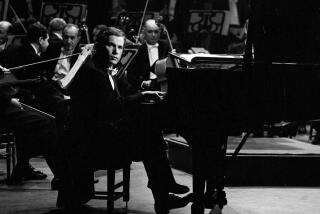Appreciation: Chess Records co-founder Phil Chess — not just the money guy
Phil Chess, the co-founder of Chicago’s great Chess Records who died Tuesday at age 95, was the quieter of the brothers who started the label that launched the careers of Chuck Berry, Muddy Waters, Willie Dixon, Etta James, Bo Diddley and so many other important early rock, blues and R&B musicians.
It was Phil’s older brother, Leonard, who usually was in the spotlight — Phil was given only token screen time in “Cadillac Records,” the 2008 feature film about Chess and its stable of musical greats, while Leonard was treated as a key player.
That’s created an impression for many that Phil’s role was largely behind the scenes — the one who handled the business affairs while Leonard tended to more of the musical matters that made Chess Records one of the most important labels in the growth of R&B and blues in the late 1940s and the subsequent birth of rock ’n’ roll in the 1950s.
See the most-read stories in Entertainment this hour »
Phil’s reputation for crediting Leonard for so much of the great music that Chess recorded and released would stand as a rare instance of humility among early players in the golden age of those label executives once branded “record men.” But it’s not entirely true.
“When people asked who was the creative impetus at the company, he’d always point to his brother,” said Andy McKaie, a former MCA Records and later Universal Music Enterprises exec. McKaie oversaw numerous reissues from the Chess catalog during his 30-year tenure at the successive companies that have controlled those recordings in recent decades.
“I was very fortunate to get to sit down and listen to those session tapes, and I heard Phil there in the studio a lot, I would say 30% to 40% of the time,” said McKaie, who retired in 2012.
“Whether he was producing the Moonglows, or a jazz album, he was in there. He was funny, like his brother. They could be crude and lewd, but they used to crack people up. [Blues man] Sonny Boy Williamson used to give him crap right back.”
He noted that sessions at Chess were often triangular in nature, a balance of input from the artist, the producer (often at Chess it was prolific songwriter, singer and bassist Willie Dixon) and one or both Chess brothers.
McKaie worked closely in the ’80s, ’90s and ’00s with Phil from his home in Tucson, Ariz., where the younger Chess sibling moved after selling the operation to GRT Crescendo after Leonard’s death in 1969. He bought a radio station in Tucson, having gotten into radio in Chicago with Leonard.
“They were smart enough to get into radio at the right time,” McKaie said. “I visited him once in Tucson. He had a nice house.
“A lot of people say Leonard deserved all the credit and that they think of Phil chiefly as the money counter, the accountant,” McKaie said. “He did that too, from what I understand. He was wonderful to work with, was always very encouraging, and whenever I had a question about anything, about what had happened or when it happened, he’d always give me his best answer.
“He would introduce me to someone, he would open doors that otherwise were closed when we were writing liner notes and putting these sets together.
“On some of the classics that I can recall, Phil was the guy, he was there.”
Yet, “Phil was always very deferential to Leonard,” he added. “I think that’s because when he came out in the 1940s, his brother was already operating Aristocrat Records,” the label they took over and changed the name to Chess.
“He joined as the lesser partner,” McKaie said. “Also, Leonard was the older brother, and Phil deferred to his older brother, as younger brothers often do, and I think it stayed that way.”
Phil also helped run the Macomba Lounge nightclub that Leonard purchased, and as Leonard increasingly devoted his time and attention to Aristocrat Records, operation of Macomba fell largely on Phil’s shoulders.
Unlike musically savvy peers such as Sun Records founder Sam Phillips, or Atlantic Records execs Ahmet Ertegun and Jerry Wexler, the Chess Brothers were functionally illiterate when it came to music.
In her 2000 book about the history of Chess, “Spinning Blues Into Gold,” author Nadine Cohodas quoted Phil saying, “If you put the [musical] scale on the wall and ask me which one was do re mi, I couldn’t tell you.” But pointing to his ear, he added, “This could tell you. That’s what told us.”
It was more a classic story of immigrants coming to the U.S. — the Chess brothers were born in Poland and arrived in the U.S. in the 1930s — and being captivated by the music they heard coming out of the African American community around their own neighborhood.
As the Guardian in the U.K. put it in a 2010 article, “That is the paradox of the Chess story. The brothers were not musical visionaries; they were small-time ‘indie’ record men making a quick buck from the poorest, least respected people in America. But their recorded bread-and-butter discs of local street musicians and bar bands still sound as fresh today as they did 60 years ago. By failing to be timely, they succeeded in being timeless.”
The brought to the recording session an average fan’s perspective rather than that of musically sophisticated musical experts.
“When you’re not musicians, you have interesting experience being in the studio with artists, and then trying to mold something,” McKaie said. “You’re at a disadvantage, but you also have the advantage of being a consumer.
“Those guys, the two of them were pretty funny. They were pretty up front about what they were creating or not. As nonmusicians, some of their comments were pretty hilarious — intentionally so, I think, to get the attention of whoever they were dealing with. I honestly think they thought they were doing the right thing.”
Follow @RandyLewis2 on Twitter.com
For Classic Rock coverage, join us on Facebook
ALSO
New biography illuminates life of Sun Records founder Sam Phillips
Chuck Berry, 90, will release his first new album in four decades, ‘Chuck’
Tupac Shakur, Pearl Jam and Kraftwerk are among the 19 nominees for the Rock and Roll Hall of Fame
More to Read
The biggest entertainment stories
Get our big stories about Hollywood, film, television, music, arts, culture and more right in your inbox as soon as they publish.
You may occasionally receive promotional content from the Los Angeles Times.






